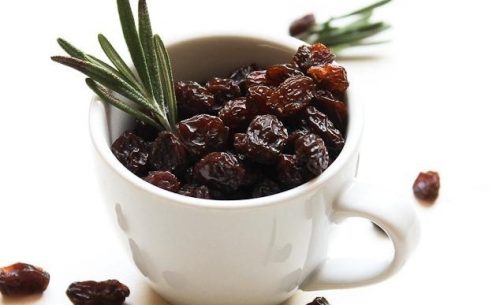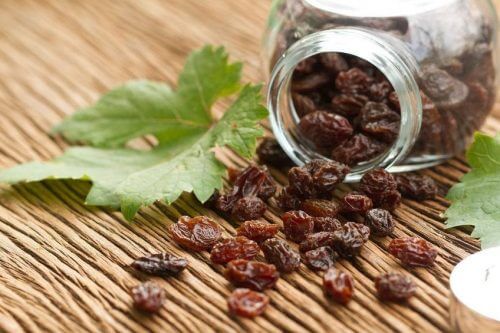Reasons to Eat Raisins in the Morning


Written and verified by psychologist Valeria Sabater
Have you ever wondered why some people recommend eating raisins in the morning and not at other times of the day? If so, don’t worry. Below, we tell you why and share other interesting information.
Raisins are a common ingredient in pastries, cakes, and confectionery. However, you can also add them to other recipes due to how versatile they are, including sweet and sour chicken with rice, yogurt and cereal, and quinoa and vegetables.
You can also use them to give your meals that extra touch of sweetness, without resorting to sugar or sweeteners. And if that weren’t enough, you can even eat them as a tasty treat.
Reasons to eat raisins in the morning
According to the Spanish Nutrition Foundation, raisins are rich in carbohydrates and fiber and also contain a good amount of calcium, phosphorus, sodium, and iron.
Experts from Spanish Nutrition Foundation have also stated that there are approximately 256 kilocalories in every 3.5 oz of raisins. This high calorific content is due to the fact that their water content is reduced during the drying process.
They also contain potassium, niacin, and provitamin A, substances which are essential for the body to function properly, especially the muscular system.
Now that you know what they contain, we can analyze the reasons why it might be good to eat raisins in the morning during breakfast or as a first snack.
1. They give you energy

Their sweetness and high nutritional content means that raisins can help to give you that energy boost you need to start the day.
- Because they contain niacin, eating raisins on a regular basis can help promote heart health.
- Their high iron content means that many people believe they can help to prevent anemia, as long as they’re eaten as part of a healthy and balanced diet.
- They also contain magnesium, a mineral essential for bone and muscle health.
- In short, it’s a good idea to consume raisins in the morning to provide your body extra nutrition and energy, so that it’s active and ready for any activity, such as working out at the gym.
2. They can help to improve bowel function

Because they’re rich in fiber, raisins can help to regulate bowel function, and, in turn, prevent constipation. Combine them with small pieces of fruit (such as apple), and enjoy improved intestinal health.
3. They’re good for bone health
You’ll be pleased to know that raisins, as well as dried figs, contain a high amount of calcium. If you add a handful of raisins to your natural sugar free yogurt, you’ll be able to boost your calcium intake, and take better care of your bone health.
- Plus, dried fruits are one of the best sources of boron, a micronutrient that’s essential for your diet. Boron is vital for proper bone formation and health, and can help promote calcium absorption in the body.
- On the other hand, as we mentioned earlier, this dried fruit also contains a good amount of potassium. Potassium is another essential nutrient, which can help combat osteoporosis and joint degeneration associated with aging.
Discover: Does eating fruits and vegetables prevent cancer?
4. They can help combat hypertension
Another reason why it’s recommended to eat raisins is that they could help to reduce arterial pressure and help promote heart health.
- It’s important to understand that raisins contain glucose. As such, the key to making the most of all the benefits they have to offer is to eat small amounts on a regular basis.
- If, for example, you eat a handful of raisins every day (approximately 1 oz), you’ll benefit from the high potassium content, which is great for reducing vascular tension and regulating arterial pressure.
- Similarly, the dietary fiber in raisins will help to regulate the biochemistry of your blood vessels, causing them to become less rigid.
Always include them in a varied diet
As we’ve seen, one of the main reasons why it’s recommended to consume raisins in the morning is their high content of carbohydrates, which are necessary for the body to get energy to be active and ready for different activities.
Experts consider that, if the body is given a snack rich in carbohydrates, such as raisins, the classic mid-morning lows and excessive coffee consumption could be avoided.
In conclusion, raisins can be a great snack option on a daily basis, but you don’t just need to limit yourself to them. It’s best to maintain a balanced and varied diet so that you don’t get bored. At the same time, make sure you give your body everything it needs to be happy, active, and ready to face the day.
All cited sources were thoroughly reviewed by our team to ensure their quality, reliability, currency, and validity. The bibliography of this article was considered reliable and of academic or scientific accuracy.
- American College of Cardiology. (2012). Snacking on raisins may offer a heart-healthy way to lower blood pressure. Consultado el 24 de abril de 2023. https://www.acc.org/about-acc/press-releases/2012/03/25/15/51/raisins_bp
- Cuesta, C., & Yikenia, J. (2023). Estilos de vida y factores de riesgo relacionados con la enfermedad cardiovascular en estudiantes universitarios. Universidad Católica San Antonio de Murcia. https://repositorio.ucam.edu/handle/10952/6046
- Ems, T., St Lucia, K., & Huecker, M. R. (2022). Biochemistry, Iron Absorption. StatPearls Publishing. https://www.ncbi.nlm.nih.gov/books/NBK448204/
- Fundación Española de la Nutrición (FEN). Alimentos y bebidas. https://www.fen.org.es/vida-saludable/alimentos-bebidas
- Gibney, M. J., Barr, S. I., et al. (2018). Breakfast in human nutrition: the international breakfast research initiative. Nutrients. 10 (5): 559. https://www.ncbi.nlm.nih.gov/pmc/articles/PMC5986439/
- Ha, J., Kim, S-A., et al. (2020). The associations of potassium intake with bone mineral density and the prevalence of osteoporosis among older Korean adults. Nutrition Research and Practice. 14 (1): 55-61. https://www.ncbi.nlm.nih.gov/pmc/articles/PMC6997142/
- Harvard T. H. Chan. (2022). The nutrition source. Fiber. Harvard School of Public Health. Consultado el 24 de abril de 2023. https://www.hsph.harvard.edu/nutritionsource/carbohydrates/fiber/
- Mayo Clinic. (2022). Dietary fiber: essential for a healthy diet. Consultado el 24 de abril de 2023. https://www.mayoclinic.org/healthy-lifestyle/nutrition-and-healthy-eating/in-depth/fiber/art-20043983
- National Institutes of Health. (2022). Calcio. U. S. Department of Health and Human Services. Consultado el 24 de abril de 2023. https://ods.od.nih.gov/factsheets/Calcium-DatosEnEspanol/
- National Institutes of Health. (2022). Hierro. U. S. Department of Health and Human Services. Consultado el 24 de abril de 2023. https://ods.od.nih.gov/factsheets/Iron-DatosEnEspanol/
- Olmo-Cunillera, A., Escobar-Avello, D., et al. (2020). Is eating raisins healthy? Nutrients. 12 (1): 54. https://www.ncbi.nlm.nih.gov/pmc/articles/PMC7019280/
- Papadaki, A., Kachrimanidou, V., et al. (2021). Mediterranean raisins /currants as traditional superfoods: processing, health benefits, food applications and future trends within the bio-economy era. Applied Sciences. 11 (4): 1605. https://www.mdpi.com/2076-3417/11/4/1605
- Pizzorno, L. (2015). Nothing boring about boron. Integrative Medicine: a Clinician’s Journal. 14 (4): 35-48. https://www.ncbi.nlm.nih.gov/pmc/articles/PMC4712861/
- Rietschier, H. L., Henagan, T. M., et al. (2011). Sun-dried raisins are cost-effective alternative to sports jelly beans in prolonged cycling. Journal of Strength and Conditioning Research. 25 (11): 3150-3156. https://www.ncbi.nlm.nih.gov/pmc/articles/PMC7081390/
- Shishehbor, F., Joola, P., et al. (2022). The effect of black seed raisin on some cardiovascular risk factors, serum malondialdehyde, and total antioxidant capacity in hyperlipidemic patients: a randomized controlled trials. Irish Journal of Medical Science. 191 (1): 195-204. https://pubmed.ncbi.nlm.nih.gov/33660114/
- Vitoria Miñana, I. (2021). Problemas digestivos y nutrición. Adolescere. IX (1): 7-13. https://www.adolescere.es/revista/pdf/volumen-IX-n1-2021/2021-n1-7_13_Tema-de-revision-Problemas-digestivos-y-nutricion.pdf
This text is provided for informational purposes only and does not replace consultation with a professional. If in doubt, consult your specialist.








